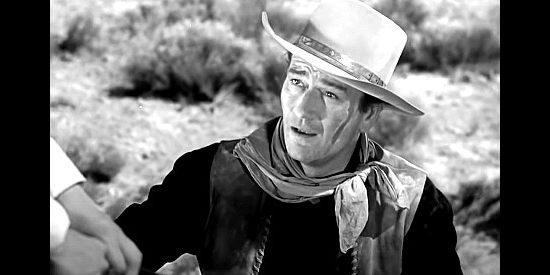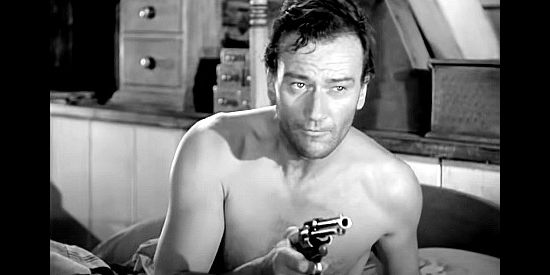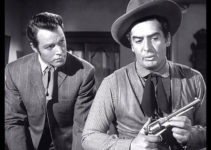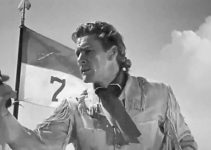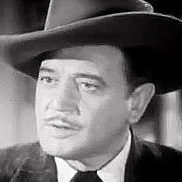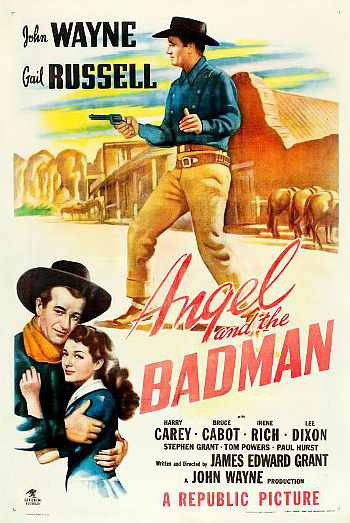 John Wayne plays Quirt Evans, a badly wounded gunman taken in by the Worth family. It turns out the Worths are Quakers, and lovely young Penelope (Gail Russell) immediately falls in love with the rugged stranger.
John Wayne plays Quirt Evans, a badly wounded gunman taken in by the Worth family. It turns out the Worths are Quakers, and lovely young Penelope (Gail Russell) immediately falls in love with the rugged stranger.
But being a Quaker means forsaking violence and turning the other cheek. Neither makes much sense to Evans, not with enemies after his hide and his land. N
evertheless, he’s taken with lovely young Penelope and tries to live a more genteel life, at least for a while.
He gets a serious case of cold feet when he attends a Quaker meeting, where he’s scoffed at by an old outlaw buddy, winds up cradling an infant and is presented a Bible for helping convince an ornery rancher to share his water supply — though it was his reputation as a gunman that actually did most of the convincing.
Presented an opportunity to get even with longtime nemesis Laredo Stevens (Bruce Cabot), Evans and two pals steal a herd of cattle Laredo has just got done rustling.
But Quirt soon realizes that without Penelope his old lifestyle no longer seems very satisfying.
At least that’s the case until it’s Laredo’s turn to get even.
When that puts Penelope on her death bed, Quirt straps on his six-gun once more and goes looking for a final showdown.
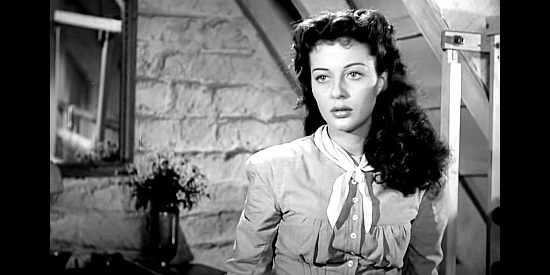
Gail Russell as Penelope Worth, wondering about the women Quirt Evans is dreaming about in Angel and the Badman (1947)
There’s a lot more focus on character and a lot less action in this film than in most Wayne Westerns. But that isn’t a bad thing; the film holds up well decades after its release.
Gail Russell is enchanting as a young Quaker girl infatuated with Quirt and not afraid to let him know it. Wayne turns in a find performance as a man reluctant to change, but who comes to recognize the emptiness of his old life once he’s met Penelope.
Harry Carey has a key role as the marshal who forever keeps on eye on Quirt, convinced he’ll wind up on the wrong end of a rope someday.
The film also features the classic scene in which Wayne drives a wagon off a cliff and into the water below with him and Penelope aboard, not to mention one of the more memorable endings in the history of Westerns.
Wayne and Russell reportedly had an affair during the making of the film, though Wayne was already married.
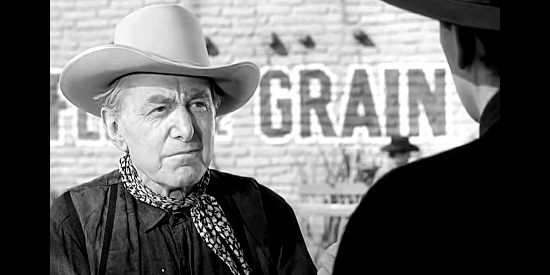
Harry Carey as Marshal Wistful McClintock, convinced his patience will pay off in Angel and the Badman (1947)
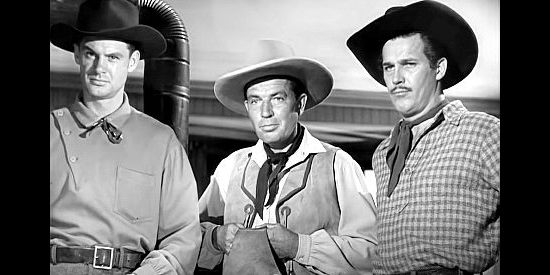
Bruce Cabot as Laredo Stevens (center) with two of his henchmen, looking for Quirt Evans in Angel and the Badman (1947)
Directed by:
James Edward Grant
Cast:
John Wayne … Quirt Evans
Gail Russell … Penelope Worth
Harry Carey … Marshal McClintock
Bruce Cabot … Laredo Stevens
Irene Rich … Mrs. Worth
John Halloran … Thomas Worth
Lee Dixon … Randy McCall
Stephen Grant … Johnny Worth
Tom Powers … Dr. Mangram
Paul Hurst … Frederick Crarson
Olin Howland … Bradley
Joan Barton … Lila Neal
Craig Woods … Ward Withers
Marshall Reed … Nelson
Runtime: 100 min.
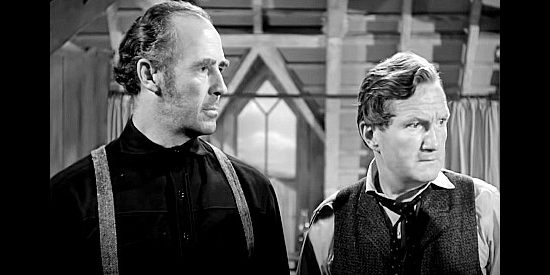
John Halloran as Thomas Worth and Tom Powers as Dr. Mangram discuss a wounded gunman in Angel and a Badman (1947)
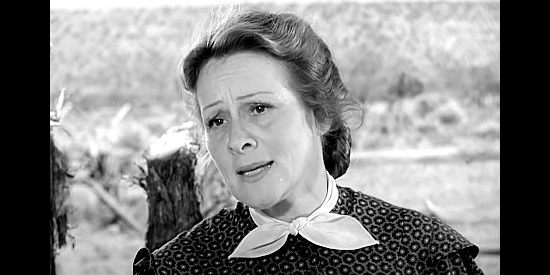
Irene Rich as Mrs. Worth, insisting her family care for the wounded Quirt Evans in Angel and the Badman (1947)
Memorable lines:
Telegraph operator: “So that’s Quirt Evans. They say he’s closed the eyes of many a man, and opened the eyes of many a woman.”
Doctor: “Once, when I was studying medicine in Europe, I had a friend, an artist. He drew portraits of people and made them resemble the animals they reminded him of. He’d have drawn this man (Quirt Evans) as a coiled cobra.”
Mrs. Worth: “Oh, doctor, you’re analogy is terribly imperfect and your naturalism faulty. Cobras don’t coil.”
Penelope Worth: “Surely, you can walk to the barn without that.”
Quirt Evans: “What?”
Penelope: “The gun.”
Quirt: “Oh, well, it balances me. One leg’s longer than the other. You know, the weight.”
Penelope: “Thee are a liar.”
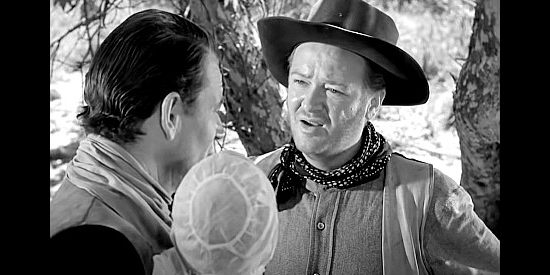
Lee Dixon as Randy McCall, a friend of Quirt Evans, surprised to find him at a Quaker meeting in Angel and the Badman (1947)
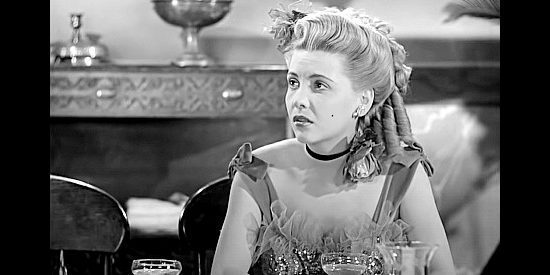
Joan Barton as Lila Neal, a saloon singer Quirt sometimes dreams about in Angel and the Badman (1947)
Quirt Evans: “You mean nobody can hurt you but yourself?”
Penelope Worth: “That’s a Friend’s belief.”
Quirt: “Well, supposing someone whacks you over the head with a branding iron? Won’t that hurt?”
Penelope: “Physically, of course. But in reality, it would injure only the person doing the act of force of violence. Only the doer can be hurt by a mean or evil act.”
Quirt: “Are there very many of you Quakers?”
Penelope: “Very few.”
Quirt: “I sort of figured that.”
Marshal McClintock: “Only a man who carries a gun ever needs one.”
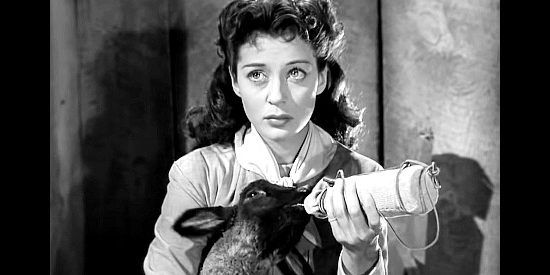
Gail Russell as Penelope Worth, pondering the possibility of a future with Quirt Evans in Angel and the Badman (1947)
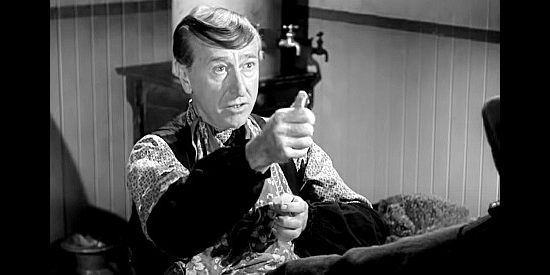
Olin Howard as Bradley, the telegraph operator who tells everyone he’s friends with Quirt Evans in Angel and the Badman (1947)
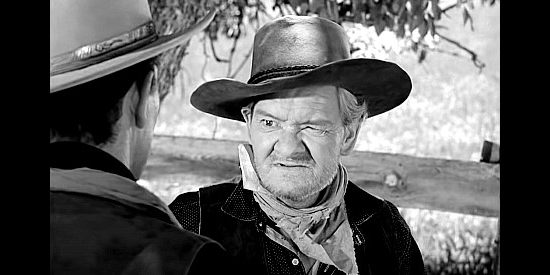
Paul Hurst as Frederick Carson, the contrary neighbor who’s dam keeps the water from flowing in Angel and the Badman (1947)
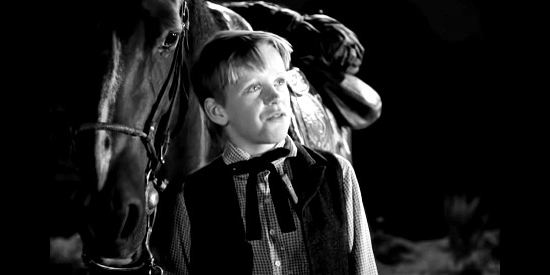
Stephen Grant as Johnny Worth, having saddled a horse for Quirt Evans in Angel and the Badman (1947)
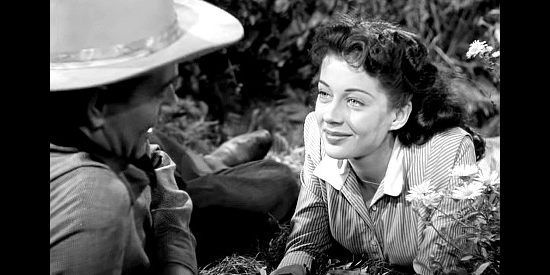
Gail Russell as Penelope Worth, falling in love with an outsider named Quirt Evans in Angel and the Badman (1947)
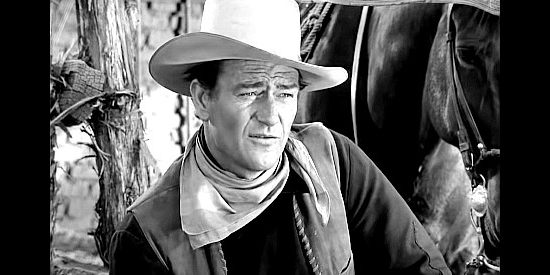
John Wayne as Quirt Evans, trying to avoid trouble after meeting Penelope in Angel and the Badman (1947)
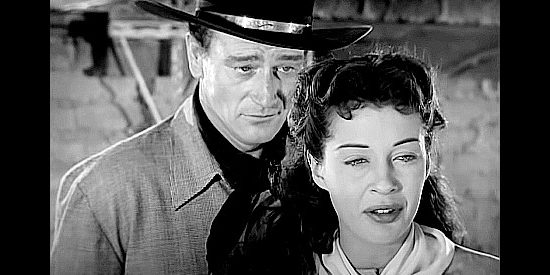
John Wayne as Quirt Evans with Gail Russell as Penelope Worth, fearing he’s scared of a life with her in Angel and the Badman (1947)
